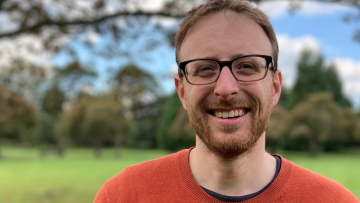Oxford Mathematician Álvaro Cartea has been appointed as the new Director of the Oxford-Man Institute of Quantitative Finance (OMI), a world-leading academic research institute at the University of Oxford that specialises in machine learning and data analytics within quantitative finance.
FFTA: Exact solutions for the SI model on networks
Abstract
The SI model is the most basic of all compartmental models used to describe the spreading of information through a population. In this talk we will present a mathematical formalism to solve the SI model on generic networks. Our methods rely on a tensor product formulation of the dynamical spreading process, inspired by many-body quantum systems. Here we will focus on time-dependent expectation values for the state of individual nodes, which can be obtained from contributions of subgraphs of the network. We show how to compute these contributions systematically and derive a set of symmetry relations among subgraphs of differing topologies. We conclude by comparing our results for small sample networks to Monte-Carlo simulations and mean-field approximations.
arXiv link: https://arxiv.org/abs/2109.03530
Woolly Owl
The coach departs the Andrew Wiles Building @ 8am - to University of Cambridge. Returning from Cambridge at 18:30.
The Woolly Owl is a day of short research talks by early career applied mathematics researchers at Oxford and Cambridge, showcasing the outstanding research of the two universities. But there’s a twist: over the course of the day the seven speakers from each side will also be competing as a team to win the coveted - and literal - Woolly Owl trophy.
If you wish to attend please email: @email
Places are limited, so first come, first served.
North Meets South
Abstract
This session will take place live in L1 and online. A Teams link will be shared 30 minutes before the session begins.
Candida Bowtell
Title: Chess puzzles: from recreational maths to fundamental mathematical structures
Abstract:
Back in 1848, in a German chess magazine, Max Bezzel asked how many ways there are to place 8 queens on a chessboard so that no two queens can attack one another. This question caught the attention of many, including Gauss, and was subsequently generalised. What if we want to place n non-attacking queens on an n by n chessboard? What if we embed the chessboard on the surface of a torus? How many ways are there to do this? It turns out these questions are hard, but mathematically interesting, and many different strategies have been used to attack them. We'll survey some results, old and new, including progress from this year.
Joshua Bull
Title: From Cancer to Covid: topological and spatial descriptions of immune cells in disease
Abstract:
Advances in medical imaging techniques mean that we have increasingly detailed knowledge of the specific cells that are present in different diseases. The locations of certain cells, like immune cells, gives clinicians clues about which treatments might be effective against cancer, or about how the immune system reacts to a Covid infection - but the more detailed this spatial data becomes, the harder it is for medics to analyse or interpret. Instead, we can turn to tools from topological data analysis, mathematical modelling, and spatial statistics to describe and quantify the relationships between different cell types in a wide range of medical images. This talk will demonstrate how mathematics can be used as a tool to advance our understanding of medicine, with a focus on immune cells in both cancer and covid-19.
Mathematigals
Abstract
This session will take place live in L1 and online. A Teams link will be shared 30 minutes before the session begins.
How can we make maths more accessible, promote its many applications, and encourage more women to enter the field? These are the questions we aim to address with Mathematigals.
Caoimhe Rooney and Jessica Williams met in 2015 at the start of their PhDs in mathematics in Oxford, and in 2020, they co-founded Mathematigals. Mathematigals is an online platform producing content to demonstrate fun mathematical curiosities, showcase ways maths can be used in real life, and promote female mathematicians. Mathematigals primarily produces animated videos that present maths in a way that is engaging to the general public.
In this session, Jess and Caoimhe will talk about their initial motivation to begin Mathematigals, demonstrate the process behind their content creation, and describe their future visions for the platform. The session will end with an opportunity for the audience to provide feedback or ideas to help Mathematigals on their journey to encourage future mathematicians.
North Meets South
Abstract
This session will take place live in L1 and online. A Teams link will be shared 30 minutes before the session begins.
Applying for academic jobs
Abstract
This session will take place live in L1 and online. A Teams link will be shared 30 minutes before the session begins.
What does a DPhil in Oxford look like?
Abstract
This session will take place live in L1 and online. A Teams link will be shared 30 minutes before the session begins.
In quantum many body physics, we look for universal features that allow us to classify complex quantum systems. This classification leads to phase diagrams of quantum systems. These are analogous to the familiar phase diagram of water at different temperatures and pressures, with ice and vapour constituting two phases. Quantum phase diagrams correspond to the different phases of matter at zero temperature, where the system is in its lowest energy state (usually called the ground state).



